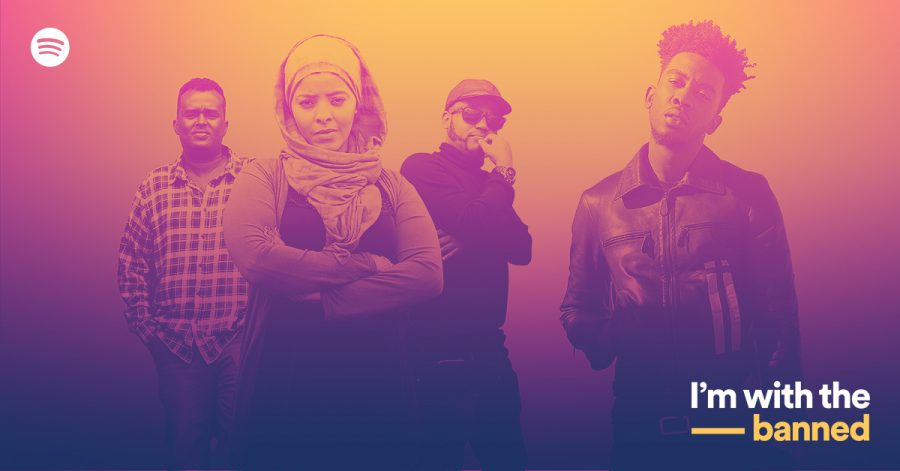OPINION: Spotify Playlist Emphasizes Common Bonds in Response to Travel Ban
November 1, 2017
Music, believed to be 55,000 years old at least, is present in all cultures and has been for all of written history. Made up of combinations of melody, tempo, dynamics, pitch, timbre, texture, and emphasis created by sounds organized in time, music was meant to communicate sentiments larger than words – music has no one language.
As Spotify’s “I’m with the Banned” playlist demonstrates so well, music also has no one nationality, no one skin color, and no one religion. The playlist, which can be found under the “Genres and Moods” section under Spotify’s “Browse” tab, features collaborations between American artists and musicians from the six countries on President Trump’s most recent version of the infamous travel ban.
Let’s step back for a moment. President Trump’s nearly year-long struggle to set travel restrictions via executive orders may be old news, but that doesn’t mean the winding path isn’t confusing. Here’s a brief run-down of events leading up to the current proposed ban: on Jan. 27, the President signed an executive order intended to bar entry into the U.S. for citizens of Libya, Sudan, Somalia, Iran, Syria, Iraq, and Yemen. Beginning the day after, a series of court decisions blocked the executive order, and succeeded in doing so up until March 6, when the President released plans for a new version of the ban. This second executive order removed Iraq from the list of countries and shortened the ban to a period of 90 days. Once again, this new ban was blocked by court action until June 26, when the Supreme Court announced that a limited version of the travel ban would go into effect on June 29. On Sept. 24, the President revealed a third ban, this one preventing citizens from North Korea and Chad along with the six countries from the original two bans. This new ban was set to go into effect Oct. 18, but a request to temporarily block the ban from Hawaii was granted before it could.
What do all six of the remaining countries have in common? Their dominant religion is Islam. What do the American artists and the musicians from those countries have in common? A love of music, and to me, that is more important than any difference between religious affiliation ever could be.
Waayaha Cusub (a hip-hop collective from Somalia), Mow Flow (singer-songwriter and rapper from Syria), Kasra V (a DJ from Iran), Sufyvn (a music producer from Sudan), Ahmed Fakroun (a singer-songwriter from Libya), and Methal (singer-songwriter and instrumentalist from Yemen) document their experiences through song and video clips, highlighting themes of identity, culture, community, war, and civil rights. Although unique to the artists’ specific situations, I felt touched listening to the tracks and reveling in just how universal they are. I believe that’s the root of just how important this project is, both on its own and as a piece of a larger picture – fear of the other only ends when we focus on the similarities between us and learn to celebrate the differences for the unexpendable value they hold.



